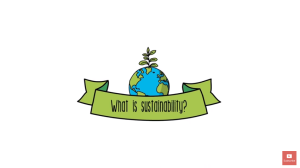Lissa’s Friday Blog Series 2 – Exploring what is meant by ‘sustainability’
My next series of blogs will be around the issue of ‘sustainability’, what it means and what action we, alongside scientists and governments can take to ensure that future generations are able to enjoy everything that we enjoy today!
So, what really is sustainability?
As I have mentioned in my previous series, sustainability is defined by the 1987 Bruntland Commission Report as “development that meets the needs of the present without compromising the ability of future generations to meet their own needs.”
There are 3 key pillars of sustainability:
Environmental: Companies are focusing on reducing their carbon footprints, packaging waste, water usage, wasteful processes as part of a supply chain and their overall effect on the environment. These processes can often be cost-effective, and financially useful as well as important for environmental sustainability.
Social: this is about upholding values that promote fairness and respect for individual rights. This focuses on combating social exclusion and discrimination, promoting solidarity, and contributing to the well-being of stakeholders.
Economic: this refers to the capacity of an economy to uphold a certain level of economic output infinitely. The economic pillar covers topics such as businesses, job creation and upward mobility, government incentives for sustainable practices, and market practices that promote environmental health and social prosperity.

